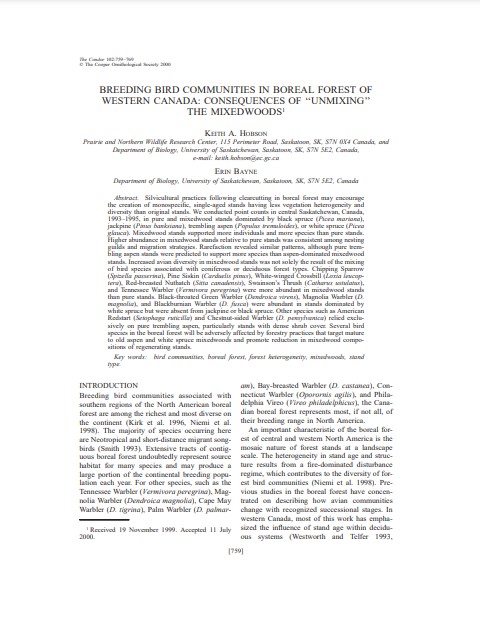Breeding Bird Communities in Boreal Forest of Western Canada: Consequences of “Unmixing” the Mixedwoods
Bosque Modelo:
Prince Albert
Temática:
Gestión forestal
Tipo de documento:
Artículo científico
Resumen
Silvicultural practices following clearcutting in boreal forest may encourage the creation of monospecific, single-aged stands having less vegetation heterogeneity and diversity than original stands. We conducted point counts in central Saskatchewan, Canada, 1993–1995, in pure and mixedwood stands dominated by black spruce (Picea mariana), jackpine (Pinus banksiana), trembling aspen (Populus tremuloides), or white spruce (Picea glauca). Mixedwood stands supported more individuals and more species than pure stands. Higher abundance in mixedwood stands relative to pure stands was consistent among nesting guilds and migration strategies. Rarefaction revealed similar patterns, although pure trembling aspen stands were predicted to support more species than aspen-dominated mixedwood stands. Increased avian diversity in mixedwood stands was not solely the result of the mixing of bird species associated with coniferous or deciduous forest types. Chipping Sparrow (Spizella passerina), Pine Siskin (Carduelis pinus), White-winged Crossbill (Loxia leucoptera), Red-breasted Nuthatch (Sitta canadensis), Swainson’s Thrush (Catharus ustulatus), and Tennessee Warbler (Vermivora peregrina) were more abundant in mixedwood stands than pure stands. Black-throated Green Warbler (Dendroica virens), Magnolia Warbler (D. magnolia), and Blackburnian Warbler (D. fusca) were abundant in stands dominated by white spruce but were absent from jackpine or black spruce. Other species such as American Redstart (Setophaga ruticilla) and Chestnut-sided Warbler (D. pensylvanica) relied exclusively on pure trembling aspen, particularly stands with dense shrub cover. Several bird species in the boreal forest will be adversely affected by forestry practices that target mature to old aspen and white spruce mixedwoods and promote reduction in mixedwood compositions of regenerating stands.
Información Bibliográfica
Autor:
Hobson, KA and E Bayne.
Revista:
The Condor
Año:
2000
N°:
4
País :
Canadá
Páginas:
759 - 769
Volumen:
102
Idioma:
Ingles
Palabras claves
bird communities, boreal forest, forest heterogeneity, mixedwoods, stand type.





